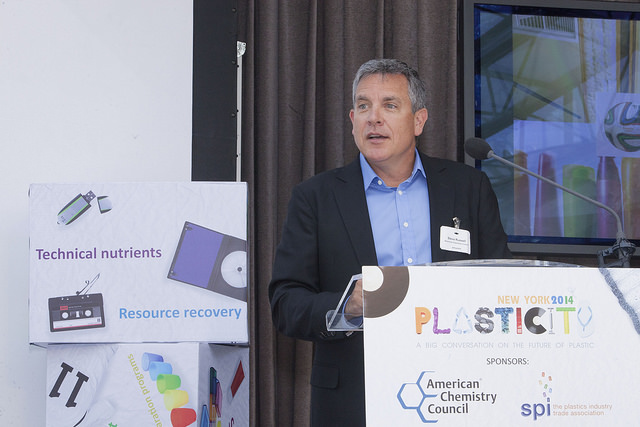Plasticity 2014 was an inspiring event. This annual discussion about the future of plastics brings together designers, brand owners, environmental groups, and public and private sector leaders to discuss design solutions, material innovations, plastic recycling, and waste reduction with the aim of encouraging further innovations and collaborations between stakeholders.
Plastics have become the “go to” material in many applications, for many reasons. They are durable, adaptable, easy to produce, and in many cases more affordable than alternatives. Our shampoo bottles don’t shatter in the shower, our cars and trucks weigh less and therefore use less fuel, our homes are well insulated and save energy, and we can ship more goods with less packaging than ever before—all thanks to plastics.
But none of us want a world where plastics fill up landfills or, worse, become litter. As a society, we need comprehensive, integrated approaches for managing our plastics resources that allow us to benefit from these incredible innovations, without trashing our planet in the process.
Plastics recycling is a relatively new area of materials recovery, but we’re catching up quickly. For example, nearly all Americans can recycle plastic bottles. Today, more than 30% of plastic bottles used are actually recycled, not far behind the estimated 34% for glass containers. Recycling of non-bottle plastic containers reached one billion pounds in 2012, which is triple the amount since just 2007. And plastic film recycling also reached one billion pounds in 2012.
At Plasticity, former NYC recycling czar Ron Gonen talked about how to increase collection rates. Gonen is now CEO of The Closed Loop Fund, an organization that will provide zero-interest loans to municipalities that invest in recycling infrastructure and invest in private companies focused on waste reduction and recycling.
The city of Edmonton, Alberta, seems to have figured out a way to go even further with its waste. Edmonton’s waste management technical specialist, Christian Felske, delivered an awe-inspiring presentation detailing how the city is taking an integrated approach to waste management, which includes recycling, composting, and energy recovery. Under this new system, waste management officials in Edmonton think that no more than 1% of plastics will end up in landfill. Can you imagine that?
The gathering of stakeholders shared tremendous enthusiasm for finding new solutions through collaboration and demonstrated a genuine interest in learning about advances in recycling and recovery technology.
As we look for ways to have a sustainable future, Bill McDonough said it best when he challenged Plasticity attendees to focus on preparing plastics for their next life, instead of on the “end-of-life” issues.
If you didn’t see Plasticity 2014 LIVE, you can watch it here through July 30th. And check out the pictures here on Flickr.






